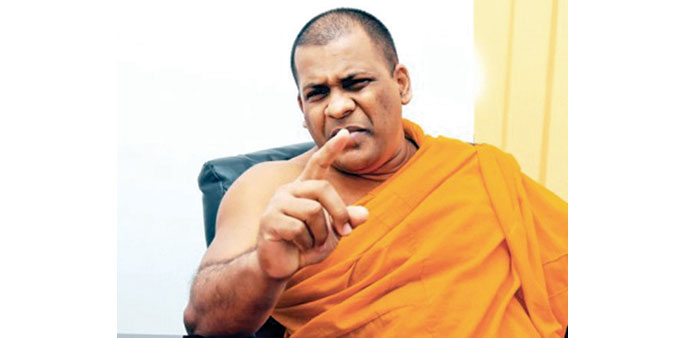A firebrand Sri Lankan monk yesterday criticised the Dalai Lama for urging the island’s Buddhists to halt violence against minority Muslims and rejected him as a global spiritual leader.
Buddhist monk Galagodaatte Gnanasara said the Dalai Lama was ignorant of the “true situation in Sri Lanka” and accused the Nobel Peace Prize winner of being a victim of “Islamic
extremist propaganda”.
The exiled Tibetan spiritual leader earlier this month asked Buddhists in Myanmar and Sri Lanka “to imagine an image of Buddha” before committing any crimes against Muslims, in a plea to halt the violence.
“We don’t accept the Dalai Lama as a world leader of Buddhists,” Gnanasara told reporters.
“He is a creation of the West. For them, he is to Buddhists what the Pope is to Catholics, but not for us.”
Hardline Buddhists in Sri Lanka have attacked dozens of shops, homes and mosques in violence against minority Muslims, whom they accuse of trying to divide the Buddhist-majority country.
The religious violence, the worst in decades, has left four people dead. It has been blamed on Gnanasara and his hardline group of monks called the Bodu Bala Sena (BBS) or Buddhist Force.
Rights groups have compared Sri Lanka’s Gnanasara to Myanmar’s hardline monk Wirathu, who has been accused of fanning religious tensions in that country.
Some 250 people have died in Myanmar since fighting broke out in the state of Rakhine
in 2012.
Gnanasara said he had met Wirathu and described both of them as “peaceful monks with no blood on our hands”.
He said his BBS had initially wanted to visit the Dalai Lama at his headquarters in northern India to encourage him to correct his perception of Sri Lanka’s Buddhists, but later changed their mind.
“We felt there was no point,” Gnanasara said. “We feel that he is already a victim of Islamic extremism.”
Sri Lanka’s mostly moderate Buddhists hold the Dali Lama in high esteem. But successive Colombo governments have denied him a visa to visit pilgrimage sites in the island, apparently due to Chinese pressure.
The Dalai Lama, who fled Tibet for India in 1959 after a failed uprising against Chinese rule, has long led a global movement for autonomy in Tibet.
China accuses him of covertly campaigning for Tibet’s independence and calls him a “splittist”.
Sri Lankan Justice Minister Rauf Hakeem warned last week that his government’s failure to restrain militant Buddhist monks would foment Islamic extremism and threaten
national security.

